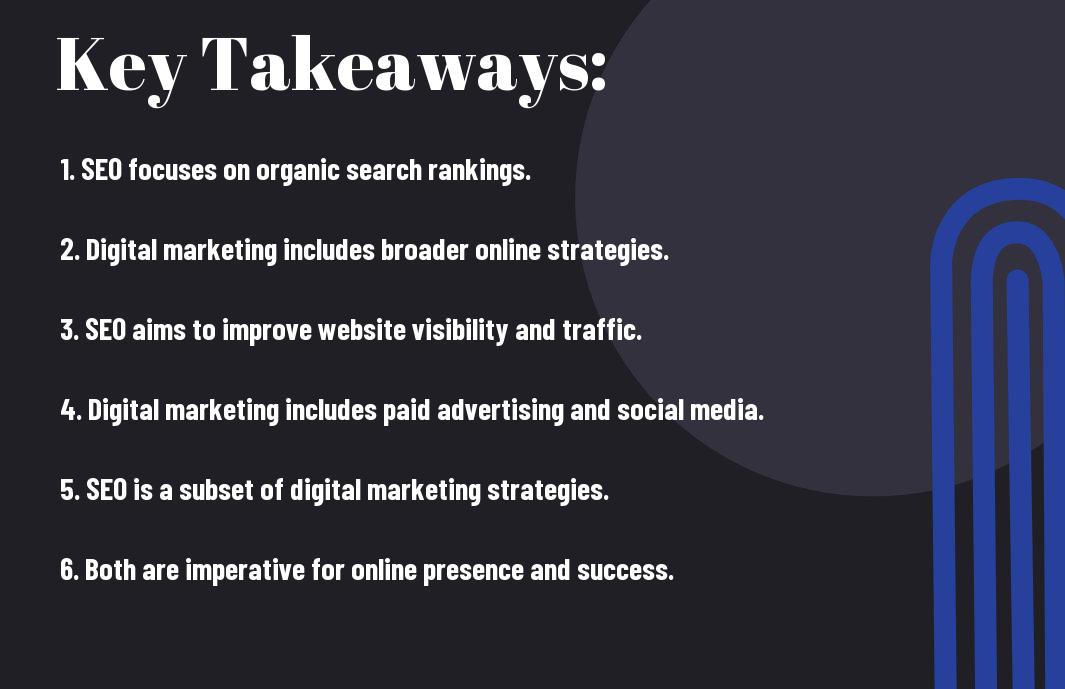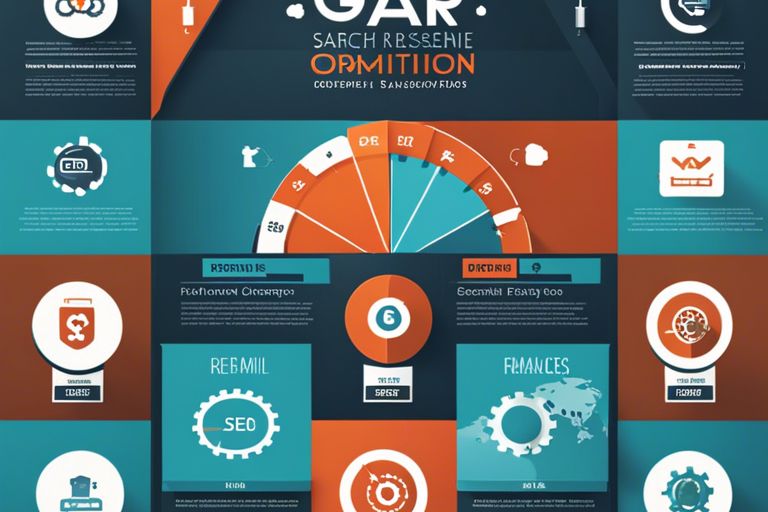SEO, which stands for Search Engine Optimization, is a pivotal component of digital marketing strategies. While both are imperative for boosting online presence and visibility, it’s crucial to understand the distinctions between the two. SEO focuses on optimizing website content to improve search engine rankings and organic traffic, whereas digital marketing strategies encompass a broader range of online tactics to reach and engage with the target audience. By delving into the nuances of each, businesses can create more comprehensive and effective online marketing plans tailored to their specific goals and objectives.
Key Takeaways:
- SEO (Search Engine Optimization) focuses on improving website visibility and ranking on search engine results. It involves optimizing website content, meta tags, backlinks, and other factors to increase organic traffic from search engines.
- Digital marketing strategies encompass a broader range of online marketing efforts beyond SEO. This includes paid advertising, social media marketing, content marketing, email marketing, and more to drive traffic, leads, and sales for a business.
- While SEO is a crucial component of digital marketing, it is just one aspect of a comprehensive digital marketing strategy. Businesses need to combine various tactics to create a holistic approach that reaches their target audience effectively and achieves their marketing goals.

Understanding The Basics
Defining SEO
With the constantly evolving landscape of online businesses, Search Engine Optimization (SEO) is a crucial digital marketing strategy used to improve a website’s visibility in search engine results pages. SEO techniques involve optimizing website content, meta tags, and backlinks to increase organic traffic and improve search engine rankings.
Defining Digital Marketing
To effectively reach a broader audience, digital marketing encompasses a wider range of strategies beyond SEO. It includes various online marketing tactics such as social media marketing, email marketing, content marketing, and paid advertising campaigns. Digital marketing leverages different channels to engage with consumers and promote products or services.
Understanding the difference between SEO and digital marketing is vital for creating a comprehensive online marketing strategy. While SEO focuses on optimizing a website to rank higher in search results, digital marketing encompasses a broader approach to reach and engage with target audiences across multiple online channels.
SEO Strategies
It Digital Marketing vs SEO : What’s the Difference? is important to understand that SEO strategies are a subset of digital marketing strategies, focusing specifically on optimizing a website to increase visibility and rankings on search engine results pages.
Keyword Research and Optimization
For successful SEO, keyword research and optimization are necessary. This involves identifying relevant keywords that your target audience is searching for and strategically integrating them into your website content to improve rankings. By understanding the search intent behind these keywords, you can attract more qualified traffic to your site.
On-Page and Off-Page SEO Tactics
For effective SEO, a combination of on-page and off-page tactics is crucial. On-page strategies involve optimizing your website’s content, meta tags, and internal linking structure. Off-page tactics, on the other hand, focus on building authoritative backlinks from other reputable websites to signal to search engines that your site is trustworthy and valuable to users.
Plus, it’s important to regularly monitor and adjust your SEO strategies based on algorithm updates and changes in search engine guidelines to maintain and improve your website’s visibility and rankings.
Digital Marketing Strategies
Despite the common misconception, SEO and digital marketing are not the same thing. To learn more about the differences between the two, you can check out this blog post on Are SEO and Digital Marketing the same thing?.
Content Marketing and Branding
For effective digital marketing strategies, content marketing and branding play a crucial role in creating brand awareness and establishing a strong online presence. By creating valuable and engaging content, you can attract and retain customers, build trust, and differentiate your brand from competitors.
Social Media, Email Marketing, and PPC
With a combination of social media marketing, email marketing, and pay-per-click advertising, you can reach a wider audience, engage with potential customers, and drive more traffic to your website. These digital marketing strategies allow you to connect with your target audience in a more personalized and direct way, ultimately leading to higher conversion rates and increased brand loyalty.
Marketing on social media platforms, sending targeted emails to subscribers, and running PPC campaigns can help you achieve your marketing goals effectively and efficiently. Each of these strategies has its own unique benefits and can complement each other to create a cohesive digital marketing strategy.
The Intersection of SEO and Digital Marketing
Not all digital marketing strategies include SEO, but SEO is an necessary component of any comprehensive digital marketing plan. In fact, the two are closely intertwined, with SEO playing a crucial role in driving organic traffic to websites and improving search engine rankings. To research deeper into the relationship between SEO and digital marketing, check out this SEO vs Digital Marketing: Which One Do You Need For … article.
How SEO Fits into Digital Marketing Campaigns
Marketing strategies that neglect SEO miss out on a significant opportunity to enhance their online visibility and reach their target audience effectively. By incorporating SEO techniques such as keyword optimization, content marketing, and link building into digital marketing campaigns, businesses can improve their search engine rankings and attract more organic traffic to their websites.
Measuring Success and ROI
An necessary aspect of any digital marketing campaign is measuring success and return on investment (ROI). By analyzing key performance indicators (KPIs) such as website traffic, conversion rates, and keyword rankings, businesses can determine the effectiveness of their SEO efforts and make data-driven decisions to optimize their digital marketing strategies for better results.

To wrap up
Hence, it is clear that while SEO and digital marketing strategies are interconnected and complement each other, they serve different purposes. SEO is more focused on optimizing websites to improve search engine rankings and organic traffic, while digital marketing encompasses a wider range of tactics such as social media marketing, email marketing, and paid advertising to reach and engage with your target audience. Understanding the nuances of each strategy and leveraging them effectively can lead to a successful digital marketing campaign that generates leads, increases brand awareness, and drives conversions.
FAQ
Q: What’s the difference between SEO and digital marketing strategies?
A: SEO (Search Engine Optimization) is a subset of digital marketing strategies. SEO focuses on optimizing your website to rank higher in search engine results, while digital marketing strategies encompass a broader range of online marketing tactics beyond just SEO.
Q: How does SEO fit into digital marketing strategies?
A: SEO plays a crucial role in digital marketing strategies by helping to increase organic traffic to your website. It ensures that your site is easily discoverable by search engines, which in turn improves your online visibility and drives more qualified leads to your business.
Q: What other components are included in digital marketing strategies besides SEO?
A: Digital marketing strategies include various components such as content marketing, social media marketing, email marketing, pay-per-click advertising, and more. These components work together to create a comprehensive online marketing plan that helps businesses reach their target audience and achieve their marketing goals.
CATEGORY:Website Design

